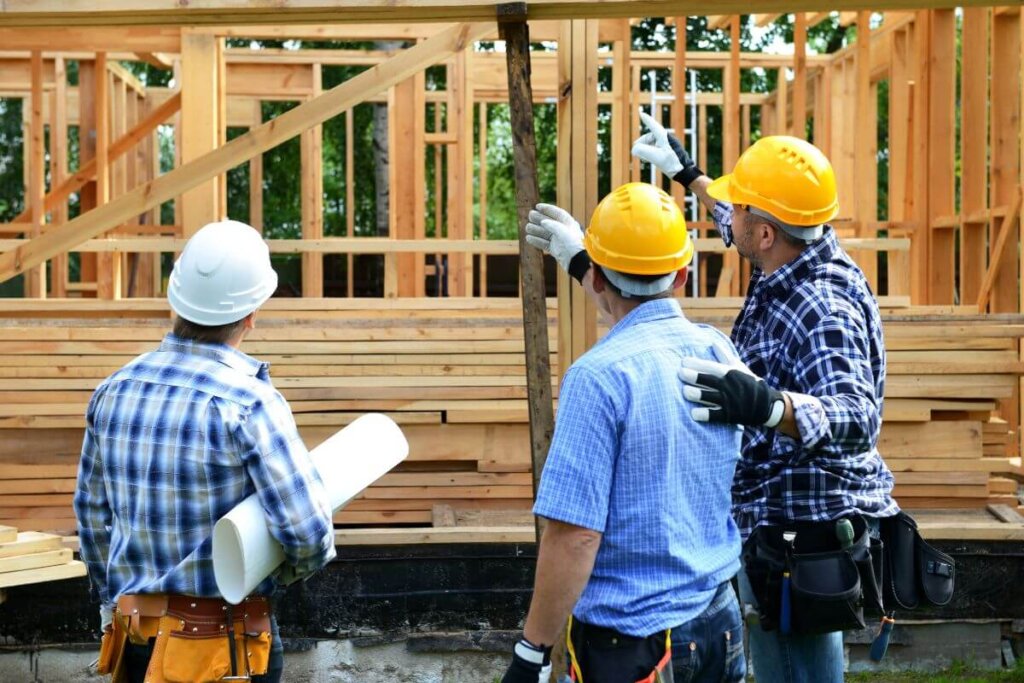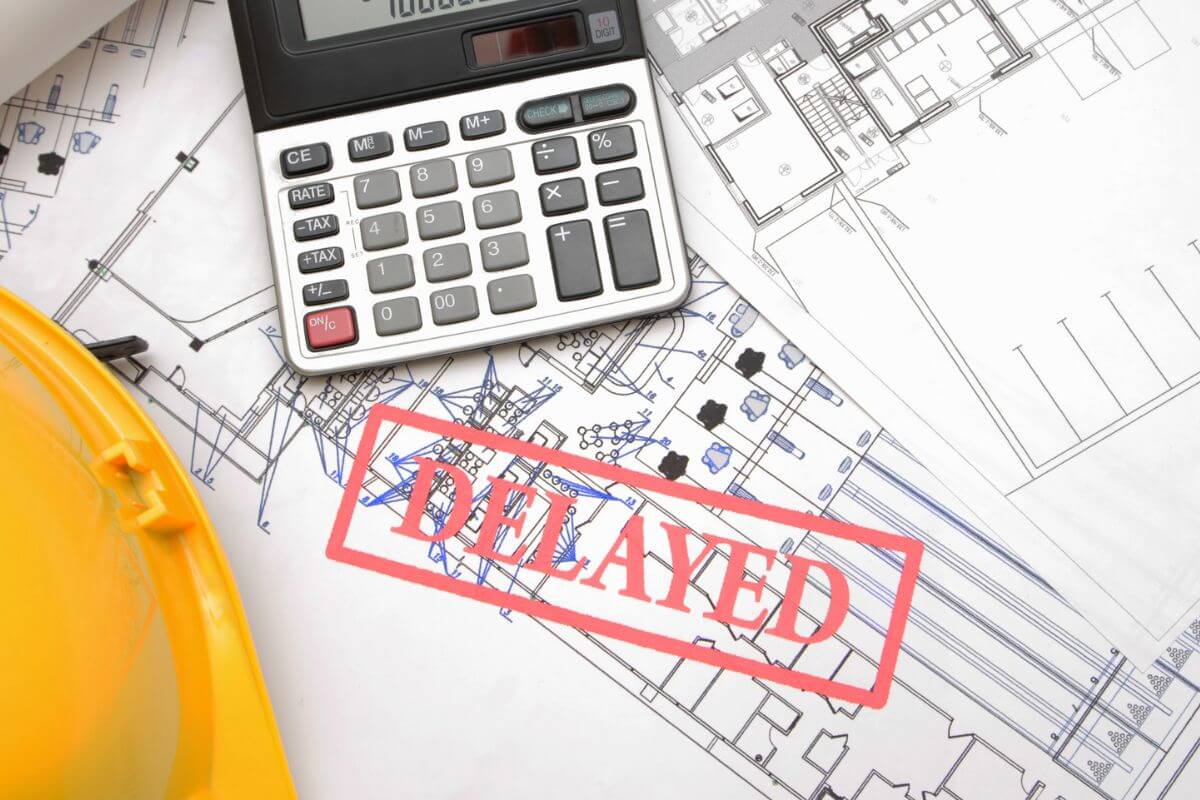Construction delays are one of the biggest issues in construction, and they cost companies on multiple levels. The most common causes of delays include labor, cost overruns, material procurement, safety infractions, and weather interruptions. Luckily, acting quickly to assess the cause of the delay, rebuilding the schedule, and investing in the right software can help get your project back on course.
Quick look
- Construction delays are common, with only 25% of projects finishing within 10% of the original timeline.
- The top causes of delays include supply management (21.41%), workforce management (20.79%), project management (17.64%), and climatic conditions (9.34%).
- Key delay factors include poorly executed handoffs, labor shortages, material procurement issues, scope changes, weather, cost overruns, and safety infractions.
- Assessing the cause of a delay, rebuilding the schedule, and investing in project management software can help minimize disruptions.
- Software solutions like ALICE and Smartbuild assist with timeline recovery, scheduling, and project management to keep construction projects on track.
Construction delays are too common
In the current market, construction delays happen more often than not. According to data from KPMG, only 25% of construction projects are finished within 10% of the original timeline. The McKinsey Global Institute also states that the larger the project, the more the completion date is pushed out, with 98% of “mega projects” typically over budget, delayed, or both.
While delays are commonplace in the industry, that doesn’t mean they aren’t preventable. A 2021 study identified the most common categories of delays and found that four main factors cause them.
- Supply management: 21.41%
- Workforce management: 20.79%
- Project management: 17.64%
- Management of climatic conditions: 9.34%
These factors account for 69.18% of the sample variance and can be further broken down into more specific, preventable causes.
The 7 most common reasons for construction project delays

1. Poorly executed handoffs
Handoffs between project disciplines must be executed clearly and precisely to prevent delays. When these transitions between trade partners are mismanaged, it requires replanning, additional meetings, updated scheduling, and wide internal communications.
A poorly executed handoff also leads to labor congestion and unnecessary rework, further impacting productivity and pushing deadlines. To reduce the likelihood of a poor handoff, companies need to implement a clear communication workflow between trades workers so proper status updates can flow between transitioning parties.
2. Labor issues
Labor issues on the job site could lead to various worker-related delays. Staffing issues such as labor shortages, improperly scheduled manpower, and hiring the wrong contractors could greatly delay any project.
Currently, the construction industry is experiencing a persistent skilled labor shortage that drives costs and delays completion. With increasing labor demands and no immediate solutions, companies must proactively extend timelines to ensure a realistic completion date and avoid disruptions.
3. Material procurement
Issues with procuring equipment and materials typically stem from delivery delays. When these deliveries are pushed back, they significantly disrupt any project timeline. Because these supply chain blockers are often unexpected, flexible scheduling around material availability is now an integral step in successful construction project management.
4. Changes in project scope
The scope of work in project planning defines all tasks, to-dos, and essential first steps on the job site. Often, the scope is broken down into a simple checklist, which must be reworked if the project scope or design changes. This creates a ripple effect throughout the project that eventually pushes the completion date.
Changes in project design usually result in rework. These changes also create discrepancies or modifications in the major planning and confuse the workforce. Therefore, additional time is needed to reroute the planning and communicate changes before the project can proceed.
5. Weather
The most unpredictable delay in any project is a delay with Mother Nature. The construction industry is highly vulnerable to adverse weather conditions such as high winds, heavy rain, and temperature extremes that can put the most routine work on hold.
These severe conditions can throw off scheduling, labor productivity, material delivery, and more cogs in the machine, creating delays and extended completion timelines.
6. Cost overruns
Many projects exceed the initial budget. This causes a ripple effect: Employees and workers will not work unless they are paid, and customers will not pay more than originally arranged if the scope of the project changes.
Cost overruns are often caused by incorrect or poor estimations. If budgeting inaccuracies occur, some worksites can be shut down for weeks or even months. According to a 2021 survey, a majority (75%) of construction owners exceeded their planned budgets, and 77% of projects experienced delays. These delays were, on average, 70 days beyond the original completion date.
7. Safety issues and injuries
Lastly, safety infractions, injuries, and fatalities can significantly delay any construction project. All construction sites are high-risk hazard areas, and in many countries, the fatality rate in construction is higher than in other industries.
When workers get injured, it results in additional costs to replace the labor, scheduling changes, loss of productivity, and ultimately extended deadlines, depending on the severity of the injury. Implementing proactive safety measures is key to reducing the risk of injury, fatality, and construction delays.
How to recover from project delays
Assess the state of the project
Before taking action to mitigate the impact of a project delay, you need to thoroughly assess the current state and communicate with all appropriate stakeholders. Determining the root cause may require interviews, phone calls, or meetings, but the results mean a more appropriate next step forward. Some questions to consider during the assessment include:
- What was responsible for the delay?
- Who oversaw or participated in the root cause?
- Was it an internal interruption, or did it come from a consultant?
- Which other external factors may have contributed?
Once these questions are answered, it’s important to inform the responsible parties that a lack of communication or proper management is blocking the project’s progress. Awareness is key to ensuring that the delays don’t happen again. Then, brainstorm together to create an action plan.
Ideally, this should be a preemptive conversation with all stakeholders to anticipate where and why a delay may occur. Anticipating a delay is the best method of prevention.
Build a new schedule
Following the assessment, your team must build a new plan and schedule to move forward. This new plan needs to include all appropriate stakeholders and start by identifying how each party has been impacted based on the original schedule.
As a team, identify the highest-priority tasks and their deadlines to get the project back on track and reduce the impact of the delay. Anything non-urgent should be deprioritized and pushed back to accommodate the equipment and resources required to complete the new high-priority tasks.
Invest in software
Construction companies should invest in software designed to handle the unique needs of tradespeople and AEC projects to prevent delays and steer them back on course. The right software will be able to handle adjusted deadlines, specialty contracting, invoicing, scheduling, proposals, and more. Examples of the most comprehensive software include:
- The ALICE platform is the world’s first pioneering tool that allows contractors to keep projects on track and quickly recover the ones that might veer off course. It creates schedules to aid with timeline recovery, which helps you avoid liquidating damages and thereby protect your project margins.
- Smartbuild is a project management tool for construction professionals that offers flat-rate pricing and quick onboarding. It supports contract management, project delivery, labor production management, proposal drafting, and more. Three platforms, smartGC, smartSUB, and smartDesigner allow contractors and companies to supercharge their projects.
Bottom line
Sometimes, project delays are inevitable. By understanding the leading causes like labor issues, material procurement, and changes in scope, your team can better anticipate and mitigate a delay and stay on track.
Investing in the right software, such as Smartbuild and ALICE, will keep you prepared and organized. In the event of a delay, a thorough assessment and revised schedule will help soften the impact. Today’s delay could be a great improvement tomorrow.
Subscribe to the newsletter and follow us on social media to stay up to date with the latest construction news.



1 comment